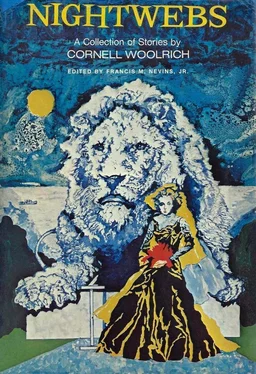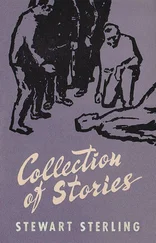“Very systematic,” Tartell commented acridly. He surged forward into the room, doubling over into a sort of cushiony right-angle as he did so, and began to zigzag, picking up papers without let-up, like a diligent, near-sighted park attendant spearing leaves at close range. “This is fine right after a heavy breakfast,” he added. “The best thing I could do!”
Joe looked pained, but on Moody’s behalf, not Tartell’s. “I’ll help you, sir,” he offered placatingly, and started bobbing in turn.
Tartell stopped suddenly, and without rising, seemed to be trying to read, from the unconventional position of looking straight down from up above. “They’re blank,” he accused. “Where does it begin?”
“Turn them over,” Moody said, wearied with so much fussiness. “They must have fallen on their faces.”
“They’re that way on both sides, Mr. Moody,” Joe faltered.
“What’ve you been doing?” Tartell demanded wrathfully. “Wait a minute—!” His head came up to full height, he swerved, went over to Gertie, and examined the unlidded machine closely.
Then he brought both fists up in the air, each still clutching pinwheels of the sterile pages, and pounded them down with maniacal fury on both ends of the writing table. The noise of the concussion was only less than the noise of his unbridled voice.
“You damn-fool idiot!” he roared insanely, looking up at the ceiling as if in quest of aid with which to curb his assault-tempted emotions. “You’ve been pounding thin air all night! You’ve been beating the hell out of blank paper! You forgot to put a ribbon in your typewriter!”
Joe, looking beyond Tartell, took a quick step forward, arms raised in support of somebody or something.
Tartell slashed his hand at him forbiddingly, keeping him where he was. “Don’t catch him, let him land,” he ordered, wormwood-bitter. “Maybe a good clunk against the floor will knock some sense into his stupid — talented — head.”
It was a sort of car that seemed to have a faculty for motion with an absolute lack of any accompanying sound whatsoever. This was probably illusory; it must have been, internal combustion engines being what they are, tires being what they are, brakes and gears being what they are, even raspy street-surfacing being what it is. Yet the illusion outside the hotel entrance was a complete one. Just as there are silencers that, when affixed to automatic hand-weapons, deaden their reports, so it was as if this whole massive car body were encased in something of that sort. For, first, there was nothing out there, nothing in sight there. Then, as though the street-bed were water and this bulky black shape were a grotesque gondola, it came floating up out of the darkness from nowhere. And then suddenly, still with no sound whatsoever, there it was at a halt, in position.
It was like a ghost-car in every attribute but the visual one. In its trancelike approach and halt, in its lightlessness, in its enshrouded interior, which made it impossible to determine (at least without lowering one’s head directly outside the windows and peering in at nose-tip range) if it were even occupied at all, and if so by whom and by how many.
You could visualize it scuttling fleetly along some overshadowed country lane at dead of night, lightless, inscrutable, unidentifiable, to halt perhaps beside some inky grove of trees, linger there awhile undetected, then glide on again, its unaccountable errand accomplished without witness, without aftermath. A goblin-car that in an earlier age would have fed folklore and rural legend. Or, in the city, you could visualize it sliding stealthily along some warehouse-blacked back alley, curving and squirming in its terrible silence, then, as it neared the mouth and would have emerged, creeping to a stop and lying there in wait, unguessed in the gloom. Lying there in wait for long hours, like some huge metal-cased predatory animal, waiting to pounce on its prey.
Sudden, sharp yellow spurts of fangs, and then to whirl and slink back into anonymity the way it came, leaving the carcass of its prey huddled there and dead.
Who was there to know? Who was there to tell?
And even now, before this particular hotel entrance. It was already in position, it had already stopped.
Then nothing happened.
Ordinarily, when cars stop someone gets out. That is what they have stopped for. In this case it just stood there, as though there were no one in it and had been no one in it all along.
Then the pale, blurry shape of a human hand, as when seen through thick dark glass, appeared inside the window and descended slowly to the bottom, like a pale-colored mussel foundering in a murky tank of water. And with it went the invisible line of a shade. The hand stopped a little above the lower rim and faded from sight again. The shade-line remained where it had been left.
In a little while a young man came walking along the street, untroubled of gait, unaware of it. The particular hotel that the ghost-car had made its rendezvous had a seamy glass canopy jutting out over the sidewalk with open bulbs set around the inside of it. But they only shone inward because its outer rim was opaque. Thus, as the young man stepped from the darkness of the street’s back reaches under this pane of light it was as though a curtain had been jerked up in front of his face, and he was suddenly revealed from head to foot as in a spotlight.
In the car the darkness found breath and whispered, “That him?”
And the darkness whispered back to the darkness, “Yeah, same type build. Same light hair. Wears gray a lot. And this is the hotel that was fingered.”
Then the darkness quickly stirred, but the other darkness quelled it, hissing: “Wait, he wants the girl too. The girl too, he said. Let him get up there to her first.”
The young man had turned off and gone inside. The four glass leaves of the revolving door blurred and made him disappear.
For a moment more the evil darkness held its collective breath. Then, no longer in a whisper but sharp as the edge of a stiletto, “Now. Go in and get the number of the room. Do it smart.”
The man behind the desk looked up from his racing form, and there was a jaunty young man wearing a snap-brim felt hat leaning there on one elbow. How long he’d been there it was impossible to determine. He might have just come. He might have been there three or four minutes already. Ghost-cars, ghost-arrivals, ghost-departures.
“Do something for you?” said the man behind the desk.
The leaner on his elbow nodded his head languidly, but didn’t say.
“What?”
The leaner considered his bent-back fingernails, blew on them and rubbed them against his coat-lapel a little. “Guy that just came in. Got any idea what his room number would be?”
“Is he expecting—”
“No.” He opened his hand and a compressed five-dollar bill dribbled out onto the desk and slowly began to expand. “He dropped this in front of the door just now. I seen him do it. Thought he might want it back.”
“You taking it up to him?”
“No. You take care of it for me. I ain’t particular.” The elbow-leaner was fiddling with one of his cuff links now.
A conniving look appeared on the clerk’s yeast-pasty face. He said, through immobile lips that made the words sound furtive, “I’ll take it up to One-one-six for you in a little while.”
“Try Streakaway in the third race tomorrow.”
The five-dollar bill was gone now.
So was the jaunty young man in the snap-brim felt hat.
He knocked because they only had one key between them. The tarnished numerals 116 slanted inward as she opened the door for him. They kissed first, and then she said, “Oh God, I’ve been so frightened, waiting all alone here like this. I thought you’d never come back!”
Читать дальше












